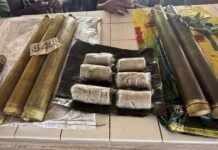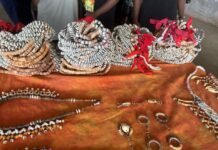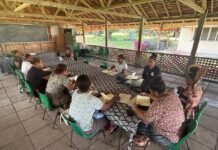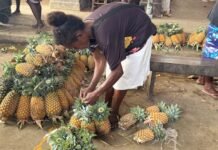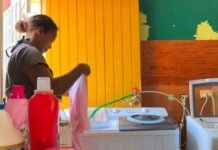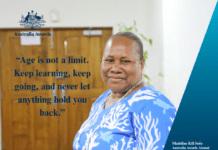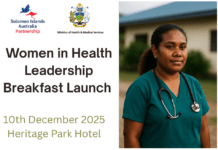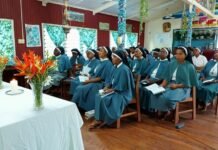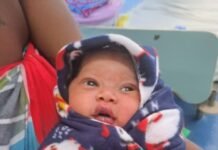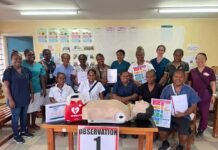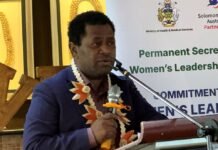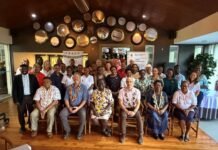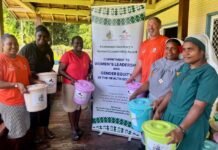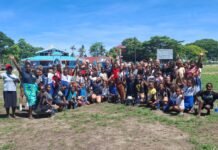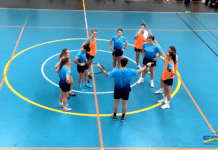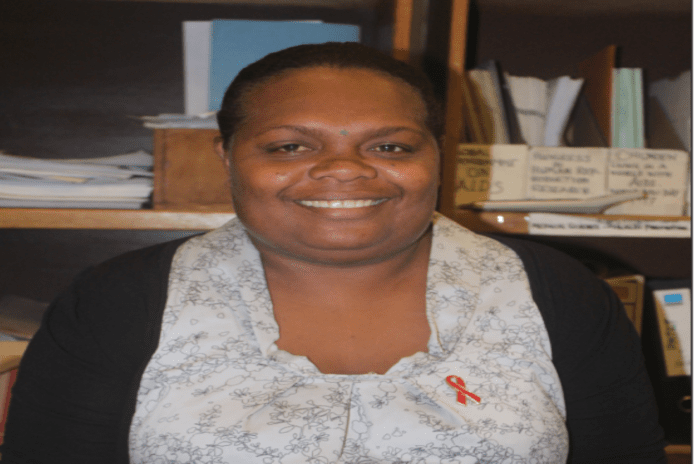BY MIKE TUA
“I felt very sad when I first knew I had HIV, I had a lot of major regrets, thinking back how my parents have invested a lot of money on my school fees but then it all ended up this way.
“I have blamed myself a lot with many unanswered questions, why do I have to hook up with such a person? If I don’t have any sexual affair with him in the first place, I should not have got it.
“Finally I have come to my senses; I have blamed myself that I have made a wrong choice which forced me to contract an HIV infection,” Alice Bouko recalls her first-hand experiences with HIV.
Bouko, now aged 33 has over years taken up a prominent role in the Ministry of Health and Medical Services, HIV Unit as an HIV Community Advocator after being diagnosed with HIV eleven years ago.
She and her partner both tested positive for HIV in 2005. But that wasn’t the end for her as she was also pregnant, too. When her baby boy was born he was pronounced as negative.
As it turns out later during those years, her partner finally passed away leaving her and their child behind. Alice also recalled that his partner was infected during her sexual contact with another person.
She remembered at that time, she always felt shy when people would stir at her wherever she sit or walk in the public.
“I often have feared that someone might describe me with discriminatory language about my HIV status.
“Even when I went back to my village, I felt that I had lost my sense of honor and pride as a member of my family and community. I noticed people’s body language and actions towards me have now changed.
“After all, I soon realized that I have changed my attitude towards my opposite sex, if they want to approach me on a more extreme level, I normally disclose my status that I am HIV positive,” she continued to recall her personal experience. “The more I continue to disclose my HIV status and provide HIV prevention awareness publicly; I noticed that I have made a lot of strong relationships and connections with other people in the society.”
As of today she has now overcome her past darkest episode in life and has now set a benchmark as a woman who has self-empowerment herself to where she is today.
As an HIV advocator she has been giving out the truth about her status as a person living with HIV, to help and motivate people living and not living with HIV about the impact of the disease so that it might help them understand just how serious it.
Her given commitment and tireless effort over the years have earned more support and opened the eyes of many people in the communities in the country about her experience with HIV.
She explains her reason why she wanted to work as a full-time HIV Community Advocator in the country.
“The reason is that my son was born negative without HIV despite being diagnosed with HIV. I am heavily involved with HIV awareness programs in the country.
“During our awareness programs in communities, most people have asked to see me as proof of a person living with HIV. They want to see my actual physical appearance. Such demand has also made me more willing to come out and reveal my HIV status publicly.
“I have told people during my awareness that HIV cannot be noticed through a person’s physical appearance for instance although my physical appearance might be fat and healthy people will not notice if I have an HIV positive status.
“Despite, a person is physically healthy or fat it doesn’t mean a person is free from HIV.”
She added that she is very happy to become an HIV advocator, especially in helping people in our communities throughout the country to know about HIV and I am also very privileged to go around helping people living with HIV.
“Because most people in the community don’t have any good knowledge and they don’t know how to distinguish a person living with or without HIV status.
“Most times people have the perception to say that a person with HIV can have a very thin body, experience heavy loss of hair but when they see my face and express the reality behind HIV, it changed their mental perception and learn to acknowledge HIV like any other diseases.”
She said HIV is preventable and it’s very important for women and girls to know how to protect themselves also if you are HIV positive and you don’t know it, you risk spreading it to other people. The only way to know your status is to get tested.
“ABC (Abstinence, Be Faithful, and Use of Condoms) preventive methods are the best way to prevent HIV from spreading.
“It is common sense and understanding that HIV is a non-preventable disease in the country and resources are now available like condoms are safe.
“But if you are in a relationship and you’re having sex, be faithful to your partner. You should both get tested.
“It’s important to know your status and the status of your partner because most women get HIV from having sex with a man who is HIV positive.
“You can’t tell by looking at someone whether or not they have HIV, so make sure you know your partner’s status.
“Getting tested for other sexually transmitted diseases is also smart. If you have another STI, it may be easier for you to get HIV if you’re exposed.
“Women and girls need to know their status because they are child bearers and most times, they are also very attractive to young boys and older men too, so, they need to know their status.
“Early detection is an important step. Treatments for HIV are better than ever. People with HIV are living longer with a better quality of life. If you are HIV-positive, it’s best to start treatment as soon as possible. With the right treatments, HIV-positive people can live for many years without developing AIDS.”
The Advocator pointed out that individuals also have their own choices and rights. It depends entirely on individuals to ensure they are responsible for their actions when exercising their rights and role in decision making.
“But it all depends on the individual choices and decision makings a person can make to avoid such infection being contracted.
“HIV cannot be transmitted to another person if they can make the right choices for themselves.”
She said it’s very important for women and girls women to know that they have to be responsible for protecting themselves.
“You’re in control of your body. It’s okay for you to say ‘no’. It’s okay for you to ask your partner to wear protection. It’s okay for you to ask questions. If you’re having sex, you must get tested and know your status.
“The most important thing for women and girls to know is their reproductive rights. I believe that most women and girls in the country don’t know about their sexual reproductive rights so most times they don’t want to talk to men about their rights as females, most of the time they always submit to their opposite sex [they are most vulnerable to make the wrong choice].
“They have their right to say no but most times they always submit or fall to their opposite sex.
“Women should get a test for HIV to know their status if they notice or suspect their husbands or partners are HIV positive or not faithful to them.
“Therefore, I think people have the misconception that if they have HIV, their life is over. It isn’t. There are treatments available to help you lead a long, high-quality life.”






